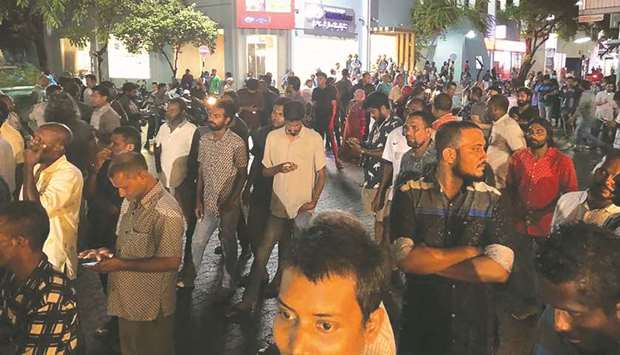The remaining three judges of the Supreme Court said in a statement they were rescinding the order to release the prisoners “in light of the concerns raised by the president”.
“The Supreme Court bench hereby rescinds number 5 of its order to release the individuals,” it said.
The court’s original decision signed by all five judges of the apex court on February 1 had quashed a terrorism conviction against former president and opposition leader Mohamed Nasheed, among others.
The shock decision of the court in support of the political dissidents was seen as clearing the way for Nasheed to end his self-imposed exile and return to the country to contest elections later this year.
The move also included an order for the government to restore the seats of 12 legislators sacked for defecting from Yameen’s party, giving the opposition the majority in the assembly and meaning they could potentially impeach the president.
But Yameen refused to comply with the order and instead declared a 15-day state of emergency in the honeymoon islands, giving sweeping powers to security forces to arrest and detain individuals while curtailing the powers of the judiciary and
parliament to impeach him.
Nasheed’s Maldivian Democratic Party (MDP) said the U-turn of the Supreme Court was due to pressure brought on the three judges.
“Yameen has used coercion to get the original decision revoked,” MDP spokesman Hamid Abdul Ghafoor said.
The Maldives’ top judge was arrested yesterday as security forces stormed the Supreme Court at dawn.
The detention of Chief Justice Abdulla Saeed and another Supreme Court judge dramatically raised the stakes after Yameen refused to comply with the court’s order to release political dissidents.
It was the latest twist in a political battle that has plunged the tiny Indian Ocean nation into crisis and sparked a strong US protest.
Several countries have warned against travel to the upmarket holiday paradise, which depends heavily on tourism, at the peak of the season.
Yameen, facing threats from a galvanised political opposition to impeach him for alleged corruption, had earlier ordered a shutdown of parliament.
In a televised address to the nation, the president accused the judges of being part of a plot to overthrow him.
“I had to declare a national emergency because there was no other way to investigate these judges,” he said.
“We had to find out how thick the plot or coup was.”
Yameen has presided over an escalating crackdown on dissent since he came to power in 2013, battering the image of the upmarket holiday paradise.
On Monday he ordered the arrest of his estranged half-brother and former president Maumoon Abdul Gayoom, who had sided with the main opposition.
The 80-year-old president for 30 years until the country’s first democratic elections in 2008 – was taken from his home in the capital Male around midnight on Monday, hours after the government announced a 15-day state of emergency.
“I have not done anything to be arrested,” Gayoom said in a video message to supporters posted on Twitter.
“I urge you to remain steadfast in your resolve too. We will not give up on the reform work we are doing.”
The exiled leader of the Maldives opposition, Mohamed Nasheed, accused Yameen of acting illegally and called on the US and India to step in and help remove him from office.
“President Yameen has illegally declared martial law and overrun the state. We must remove him from power,” said Nasheed, the first democratically elected leader of the Maldives, in a statement issued yesterday.
“We would like the Indian government to send an envoy, backed by its military, to free the judges and the political
detainees.”
Nasheed was jailed in 2015 after he was convicted on a terrorism charge widely seen as politically motivated. He has been in exile since 2016 when he travelled to the UK for medical treatment and was granted
asylum there.
He has repeatedly accused Yameen of corruption and pledged to return from exile and run for president in elections due to be held later this year, after the Supreme Court last week quashed his terrorism conviction.
Yesterday, he said he was calling on India to send troops to the strategically located archipelago, which has grown increasingly close to regional rival China under Yameen’s leadership.
The United States said it was “troubled and disappointed” by the move and called on Yameen to comply with the rule of law.
The United Nations, Australia, Britain, Canada, India and the US had welcomed the court’s decision last week, while UN Secretary General Antonio Guterres at the weekend called for “restraint”.
The escalating crisis has also led several countries including the US and China to advise their citizens against travelling to the Maldives.
Last year nearly 1.4mn foreign holidaymakers visited the tiny nation of 1,190 coral islets famed for its pristine and secluded beaches.
This handout image received from the Mihaaru newspaper shows opposition supporters outside the Supreme Court in Male after Maldivian President Abdulla Yameen declared a state of emergency, yesterday.

